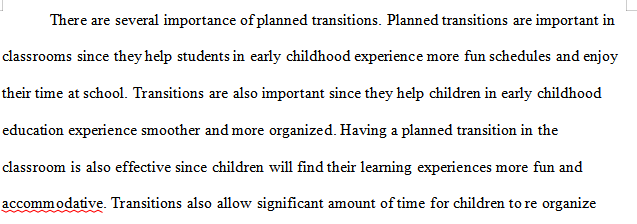Planning Transition Activities
Transitions can be difficult for young children as they move from one activity to another. Transitions can lead to challenging behavior if not carefully planned. Effective transitions can make a change in activity smoother for both children and educators.
Review the following early childhood preschool schedule without planned time for transitions. Consider how and where planned transition activities can be added to create continuity throughout the day.
Preschool Schedule
7:30 – Children arrive, manipulatives, and table activities
8:00 – Handwashing, Breakfast
8:30 – Large Group Learning/Circle Time
9:00 – Centers/Free Play
9:45 – Bathroom, handwashing
10:00 – Outdoor play
10:45 – Bathroom, handwashing
11:00 – Lunch
11:30 – Stories
12:00 – Rest
Consider the importance of transitions. Determine three areas where a transition is needed in the schedule. Be sure the transition activities are appropriate for children ages 3 years to 5 years. Include three different types of transitions, such as:
- Start to sing a song
- Prepare the environment
- Catch the children’s attention
- Excuse the children according to a specific characteristic
In 2-3 pages in a Word document, discuss the following:
- The general importance of planned transitions
- Descriptions of the added transitions
- The rationale for the added transitions
- Information about Developmentally Appropriate Practice and child development related to transitions
Incorporate at least two credible sources to support your insights and opinions. Use in-text citations where appropriate. Include an APA formatted title page and a reference page. Be sure to proofread your work for grammar, spelling, and punctuation on all documents.
Answer Preview

